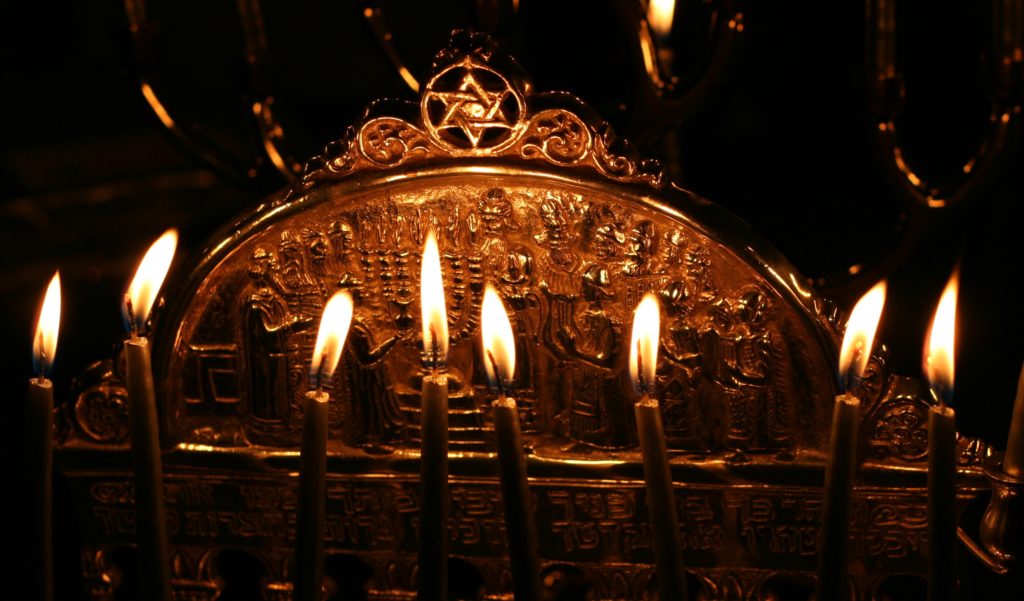
Tonight begins the eight nights of Hanukkah, the Jewish holiday commemorating the rededication of the Holy Temple in Jerusalem. Many of the greatest composers in classical music history were Jewish, and many expressed their heritage through the music they composed. To celebrate each of the eight nights of Hanukkah, here are eight classical pieces on Jewish themes.
Salamone Rossi: “Elohim Hashiveinu” from
The Songs of Solomon
https://youtu.be/hQQYDUTO7t8
In an era when the Roman Catholic Church dominated Europe and sacred music was almost exclusively in Latin, Italian Jewish composer Salamone Rossi broke with tradition by publishing
The Songs of Solomon in 1623, a collection of Jewish liturgical music in the original Hebrew. It is noteworthy, though, that Rossi’s music has more in common with Monteverdi, who was very fashionable at the time, than traditional cantorial singing.
Ernest Bloch: “Avodath Hakodesh” (“Sacred Service”)
Before Bloch’s work, there wasn’t (and still isn’t) much Jewish liturgical music that could also stand alone in the realm of sacred classical music, like the many settings of the Catholic Mass. Bloch composed “Avodath Hakodesh” for a San Francisco congregation in the 1930s and ambitiously scored it for a large chorus and orchestra fitting for his lush, late Romantic style.
Mikhail Gnesin: “Variations on a Jewish Folk Theme”
Like Bartok in Hungary and Vaughan Williams in England, Russian composers like Gnesin became interested in preserving folk music (and in Gnesin’s case, specifically Jewish folk music) and using it as inspiration for their classical compositions. In 1908 Gnesin became one of the founding members of the St. Petersburg Society for Jewish Folk Music, which strived to accomplish just that. He composed “Variations on a Jewish Folk Theme” just a handful of years later in 1917.
Aaron Copland:
Vitebsk
Responsible for crafting the quintessential American sound in the 20
th century, it’s fascinating that many parts of Copland’s identity—he was Jewish, privately homosexual, and a political Leftist during the era of McCarthyism—were considered “othered” identities within American culture. The 1928 piano trio
Vitebsk is one of the few instances where Copland directly engages with material that reflects his Jewish identity. The piece is a musical departure for the composer as well. In it, Copland weaves dissonant quarter tone harmonies (hear them evoke the shofar, a ceremonial ram’s horn used for Jewish services, at the beginning of the piece) with stark piano chords and borrowed folk themes.
Steve Reich:
Tehillim: II. Psalm 34:13-15
Perhaps best known for his minimalist compositions which focus on the repetition of small musical ideas, Reich’s work on
Tehillim marks both a musical and personal change for the composer. With a renewed interest in his Jewish heritage, Reich set Biblical Psalms in their original Hebrew for the four sections of the work. Musically, Reich relied less on minimalist principles and allowed the syntax of the Hebrew language to guide his rhythmic and melodic choices.
Leonard Bernstein:
Chichester Psalms
Bernstein composed two of his most overtly Jewish works, his Third Symphony (
Kaddish) and
Chichester Psalms, in the mid 1960s. While
Kaddish is a statement of profound despair,
Chichester Psalms is more hopeful and uplifting. Bernstein wrote the piece — a setting of Hebrew Psalms — after receiving a commission from the Very Reverend Walter Hussey, Dean of the Cathedral of Chichester in Sussex, England. The Reverend hoped that the work would also reflect Bernstein’s popular style of composing, despite its sacred nature. “Many of us would be very delighted,” Hussey wrote to the composer, “if there was a hint of West Side Story about the music.”
George Frideric Handel: “See, the Conqu’ring Hero Comes!” from
Judas Maccabaeus
Although not Jewish himself, Handel was fond of writing on Jewish subjects, including the oratorios
Solomon, Esther,
Joseph and
Saul. In the 18th century, London’s small Jewish community was fond of the composer’s work, particularly
Judas Maccabaeus. The oratorio tells of the victory of Judah Maccabee, the rededication of the Temple and the story of Hanukkah. The tune of “See, the Conqu’ring Hero Comes!” is still performed during Hanukkah today, and is often adapted for children’s songs like “Hava Narima,” as heard below.
Itzhak Perlman and Yitzchak Meir Helfogt: “A Yidishe Mame” (“A Jewish Mother”)
As one of the most famous violinists in the classical world, Itzhak Perlman has expressed his Jewish heritage through music in a multitude of ways, including
jamming with Klezmer musicians and famous collaborations with John Williams and Steven Spielberg for the soundtrack to
Schindler’s List. Here he collaborates with Cantor Yitzchak Meir Helfogt for a performance of what Perlman refers to as “Jewish comfort music.”
